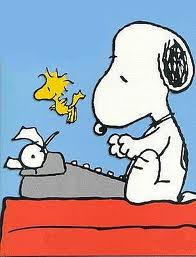The Business of Writing: Joining the Community
 I spoke to some creative writing students at a local university a while ago and I tried to tell them something it took me a long time to understand: when you begin your writing career, you’re joining a community.
I spoke to some creative writing students at a local university a while ago and I tried to tell them something it took me a long time to understand: when you begin your writing career, you’re joining a community.
By writing career, I mean your first published work. In my case, I was first printed in a ‘zine titled Gauntlet. Before I submitted my story to the magazine, about the only thing I knew about Gauntlet was that it was open to heroic fiction and sword-and-sorcery. I was making a common mistake — I didn’t know the market.
It’s hard to know ALL the markets, especially when, in those bygone days of yore, to know about the magazine you had to buy an issue. (Most of those little magazines couldn’t be leafed through at local bookstores because they weren’t carried.) Today we submitters have it a little simpler because most magazines have web sites where fiction can be sampled. And, of course, an increasingly large number of magazines ARE e-zines.
I may not have known about Gauntlet (long out of print, alas) before I submitted, but when I was accepted for publication, I read the other stories in the same ‘zine with my tale, and found a fair number that I rather liked. Some I liked so well that I wrote the authors, which is how I became friends with Joe McCullough, Barbara Tarbox, and Shauna Bryce. When I was later published by Fraser Roland’s Sword’s Edge e-zine, I struck up a friendship with another writer, Eric Knight, after I read and loved a short story by him in the same issue.
 I was reaching out to people because writing is a lonely business and I wanted to meet some kindred spirits. What I didn’t realize was that I was also forming a network of friends and allies, AKA “networking.” I dislike that word, though, because it suggests that one is cold-bloodedly setting forth to make friends to climb the ladder, probably before callously putting them aside for new and better and more powerful contacts as one advances. I realize now that I was becoming part of a writing community.
I was reaching out to people because writing is a lonely business and I wanted to meet some kindred spirits. What I didn’t realize was that I was also forming a network of friends and allies, AKA “networking.” I dislike that word, though, because it suggests that one is cold-bloodedly setting forth to make friends to climb the ladder, probably before callously putting them aside for new and better and more powerful contacts as one advances. I realize now that I was becoming part of a writing community.
Many writers grow up thinking of the writing profession as a noble romantic one, where we sit alone in a tower room with our raven on a bust of Poe and a cat in our lap. Well, okay, I never pictured that, exactly, but I expected that I would write stuff and I just had to send it out until some editor finally printed me, probably sooner rather than later. As I became a regular at various magazines, I realized just how rewarding it was to be exchanging letters with editors and fellow authors and even readers from the various magazines. After I jumped the editorial fence, I started to comprehend that part of what you’re doing with a magazine is helping to build a community of writers and readers.
If my younger self were getting started today and I could somehow communicate with him, I’d tell him to make sure he knew the kind of stories a magazine published and that if he didn’t like those stories, that the magazine probably wouldn’t like his. I’d tell him to submit to a magazine that published stories he liked, and to join in the discussion.
We wouldn’t be working so hard to get published in this genre if we didn’t love the genre, and I can trace a lot of my success back to actually becoming involved in it (I already posted about the exact steps to my book deal a year or two ago). Corresponding with other writers, writing reviews for genre sites, reading slush, writing editorials, editing for ‘zines and magazines. Eventually, a whole lot of people had heard of me, so that I wasn’t a complete unknown when it got to be time to try to promote my books.
I didn’t know that was going to happen — I just couldn’t stay away from fantasy fiction, particularly heroic fiction. But it DID happen, and even though every author’s journey is a little different, surely there’s some lessons from this story some of you out there could find useful.
0 Comments